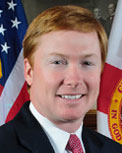Putnam Pitches Cutting Energy Taxes For Businesses, Shoppers
October 15, 2013
Agriculture Commissioner Adam Putnam wants an annual sales-tax holiday on energy-saving appliances similar to the back-to-school tax holiday.
And he said the sales tax on energy used by businesses needs to be trimmed, with the remaining revenue redirected for school construction and maintenance.
The two proposals were among several Putnam announced Monday for the 2014 legislative session during an appearance at the start of the two-day Florida Energy Summit in Orlando.
 In addition to cutting in half the 7 percent sales tax on energy use by businesses and seeking a tax holiday on energy-saving appliances, Putnam also proposed expanding to commercial properties a residential property-tax exemption on installing renewable-energy systems and undertaking a study on Florida’s future natural gas demands.
In addition to cutting in half the 7 percent sales tax on energy use by businesses and seeking a tax holiday on energy-saving appliances, Putnam also proposed expanding to commercial properties a residential property-tax exemption on installing renewable-energy systems and undertaking a study on Florida’s future natural gas demands.
Putnam, who in 2012 was able to get lawmakers to approve the state’s first comprehensive energy plan in five years, said the proposals are intended to reduce energy costs for businesses and consumers, identify energy infrastructure needs and support energy innovation.
“We’re in the early stages of an energy revolution with a profound potential for our nation, profound potential in workforce, profound potential in manufacturing, profound potential in export markets and reversing our dependency on hostile nations for the life blood of our nation’s economy,” Putnam said.
The proposal drew support from legislators, who also noted they are early in the budget process.
“Commissioner Putnam has proposed ideas that are bold and incentivize energy efficiency in Florida,” House Speaker Will Weatherford, R-Wesley Chapel, said in a release. “The Florida House is always supportive of tax cuts, and using the commissioner’s proposal, we will continue to determine what is feasible before next session.”
Putnam’s proposal comes as state economists have projected a surplus of $845.7 million for the 2014-15 budget year and as Gov. Rick Scott has requested a $500 million cut in taxes and fees.
Cutting the sales tax that private firms pay for electricity to 3.5 percent would be expected to collectively save businesses about $250 million a year. Putnam wants to use the remaining money as a revenue source for the Public Education Capital Outlay (PECO) program. Currently, the money goes into the state’s general revenue.
Rep. Michelle Rehwinkel Vasilinda, D-Tallahassee, while attending the summit, tweeted that Putnam has “come up with some strategic ideas,” but she also declared that “this investment in natural gas will backfire as dependence.”
“The dependence on natural gas needs no promotion,” Rehwinkel Vasilinda tweeted. “We must be focused beyond natural gas so we don’t get stuck on the same path as petrol.”
The multi-decade natural gas forecast, which currently doesn’t have an estimated cost, would be aimed at helping lawmakers and businesses make decisions about growth and hiring, Putnam said.
“The analysis will evaluate the risks associated with the state’s growing reliance on one fuel source,” Putnam explained. “The study will assess long-range infrastructure needs, above-ground storage and liquefaction, opportunities for natural gas in transportation and pricing predictions.”
The request for a long-term outlook on natural gas comes as the state Public Service Commission is expected to vote Oct.24 on a proposal, spearheaded by Florida Power & Light, that would create a two-phase, 591-mile Alabama to Indiantown natural gas pipeline.
The pipeline, which has support of the commission’s staff, would become the third major pipeline into the state.
The sales tax holiday, which could be held over several days like the back-to-school holiday on clothing and other items in early August, would apply to Energy Star appliances under $1,500.
“The tax-holiday weekend on Energy Star appliances will not only save consumers money on purchases and utility bills — it will help us conserve our precious energy and water resources,” Putnam said.
In addition to those changes that require legislative support, Putnam also intends to shift about $4 million to a new clean energy research and development matching fund from the 2006 Renewable Energy and Energy-Efficient Technologies Grant Program.
“Many states offer matching funds for this purpose, but Florida historically has not,” Putnam said.
The money has gone unused as some of the originally proposed grant projects were never completed or a project didn’t meet pre-set goals, a spokeswoman for Putnam’s office noted.
Putnam called that “recycling.”
By Jim Turner, The News Service of Florida



Comments